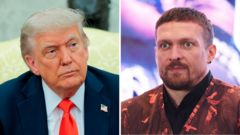A federal trial set to begin in Washington could determine the fate of Instagram and WhatsApp as the FTC accuses Meta of maintaining a monopoly on social media platforms.
Landmark Federal Trial Questions Meta's Market Power

Landmark Federal Trial Questions Meta's Market Power
The FTC's antitrust case against Meta could reshape social media ownership dynamics.
The highly anticipated antitrust trial against Meta commenced in Washington on Monday, igniting discussions about its significant market control. The Federal Trade Commission (FTC) alleges that the company has leveraged its acquisitions of Instagram in 2012 and WhatsApp in 2014 to stifle competition and establish a monopoly within social media. While these acquisitions were initially approved by the FTC, the commission pledged to oversee the developments that followed. A successful outcome for the FTC could compel Meta's CEO, Mark Zuckerberg, to divest both platforms.
Meta has maintained confidence in its legal standing, suggesting that Instagram has enhanced user experiences since its acquisition. “The FTC’s argument suggests that buying Instagram aimed to eliminate competition against Facebook,” noted Rebecca Haw Allensworth, an antitrust law professor at Vanderbilt University. She highlighted that Zuckerberg’s past statements, particularly his assertion that "it's better to buy than to compete," could have significant weight during the proceedings.
Experts anticipate testimony from Zuckerberg and former COO Sheryl Sandberg throughout the trial, which may last several weeks. Intriguingly, the case, officially titled FTC v Meta, has already become politically charged due to its origin in Donald Trump’s administration, with indications that Zuckerberg attempted to persuade Trump to influence the FTC's course of action.
The political landscape surrounding the case complicates matters. Trump’s recent firings of FTC commissioners, along with potential biases resulting from his direct interactions with Zuckerberg, evoke concerns about the political motivations behind the enforcement of the antitrust lawsuit. FTC commissioners like Rebecca Kelly Slaughter have voiced concerns about possible political pressures affecting the trial's integrity.
The legal spectrum regarding antitrust cases is under scrutiny, especially as another high-profile lawsuit, USA v Google, unfolds, which successfully argued that Google monopolizes online search. Experts like Laura Phillips-Sawyer from the University of Georgia are skeptical about the FTC's chances against Meta, suggesting the agency might face significant challenges establishing its claims, given the comparatively competitive landscape of social media compared to search engines. Meta has stressed that its platforms face competition from a variety of others, both domestically and internationally.
As this landmark trial progresses, it may reshape not only the operational framework of Meta's social media platforms but also set crucial precedents for future antitrust measures in the ever-evolving digital landscape.
Meta has maintained confidence in its legal standing, suggesting that Instagram has enhanced user experiences since its acquisition. “The FTC’s argument suggests that buying Instagram aimed to eliminate competition against Facebook,” noted Rebecca Haw Allensworth, an antitrust law professor at Vanderbilt University. She highlighted that Zuckerberg’s past statements, particularly his assertion that "it's better to buy than to compete," could have significant weight during the proceedings.
Experts anticipate testimony from Zuckerberg and former COO Sheryl Sandberg throughout the trial, which may last several weeks. Intriguingly, the case, officially titled FTC v Meta, has already become politically charged due to its origin in Donald Trump’s administration, with indications that Zuckerberg attempted to persuade Trump to influence the FTC's course of action.
The political landscape surrounding the case complicates matters. Trump’s recent firings of FTC commissioners, along with potential biases resulting from his direct interactions with Zuckerberg, evoke concerns about the political motivations behind the enforcement of the antitrust lawsuit. FTC commissioners like Rebecca Kelly Slaughter have voiced concerns about possible political pressures affecting the trial's integrity.
The legal spectrum regarding antitrust cases is under scrutiny, especially as another high-profile lawsuit, USA v Google, unfolds, which successfully argued that Google monopolizes online search. Experts like Laura Phillips-Sawyer from the University of Georgia are skeptical about the FTC's chances against Meta, suggesting the agency might face significant challenges establishing its claims, given the comparatively competitive landscape of social media compared to search engines. Meta has stressed that its platforms face competition from a variety of others, both domestically and internationally.
As this landmark trial progresses, it may reshape not only the operational framework of Meta's social media platforms but also set crucial precedents for future antitrust measures in the ever-evolving digital landscape.





















